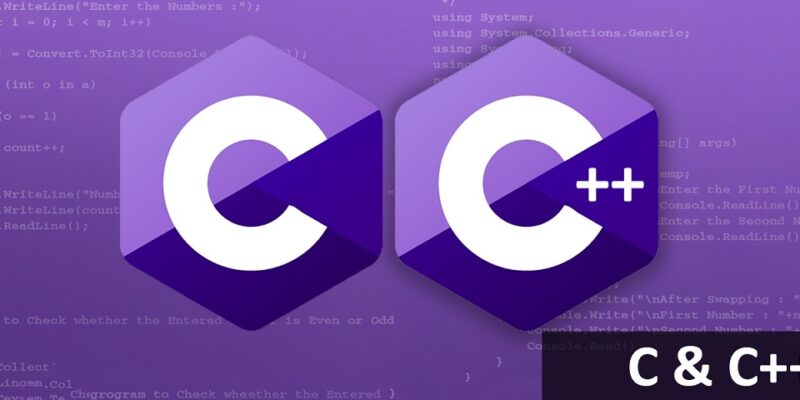
Programming languages form the backbone of software development, with each offering distinct features and capabilities. Among the many languages available, C and C++ stand out as powerful tools. Understanding the differences between C VS C++ is essential for programmers aiming to optimize their coding practices and create efficient software solutions.
Exploring C VS C++: A Comparative Analysis
Both C and C++ are powerful programming languages, each with its own strengths and unique characteristics. Understanding their differences is crucial for developers to choose the right language for their specific projects and requirements.
- Understanding C Programming Language
C is a procedural programming language known for its simplicity and efficiency. It’s widely used in system programming, embedded systems, and developing operating systems due to its low-level access to memory. C provides a structured approach to programming and is known for its portability and high performance.
- Understanding C++ Programming Language
C++ is an extension of the C language, introducing object-oriented programming (OOP) features. It retains the core functionalities of C while adding classes, inheritance, polymorphism, and encapsulation. This allows for more complex, modular, and reusable code, making C++ suitable for large-scale software development.
Key Differences Between C and C++
- Programming Paradigm:
- C is primarily procedural, focusing on functions and structured programming.
- C++ supports both procedural and object-oriented programming paradigms, offering additional features for data abstraction and encapsulation.
- Syntax and Features:
- C has a simpler syntax with fewer built-in features compared to C++.
- C++ has more advanced features like classes, templates, and exceptions, making it more versatile but also more complex.
- Memory Management:
- In C, memory management is manual, requiring explicit allocation and deallocation using functions like malloc() and free().
- C++ introduces concepts like constructors and destructors, offering more sophisticated memory management with automatic memory allocation and deallocation using RAII (Resource Acquisition Is Initialization).
- Standard Libraries:
- Both languages have different standard libraries tailored to their features and functionalities.
- C++ has a more extensive standard library compared to C, offering additional data structures, algorithms, and I/O functionalities.
Advantages of Using C Programming Language
- Efficiency: C is highly efficient and offers low-level memory manipulation, allowing direct access to hardware, which is crucial in developing system software and applications where performance is critical.
- Portability: C programs are portable across different platforms and operating systems, making them versatile for a wide range of applications without significant modifications.
- Structured Approach: C supports a structured programming paradigm, enabling developers to break down complex problems into simpler modules, enhancing code readability and maintainability.
- Rich Library Support: It offers a rich set of libraries, providing functions for various operations like I/O, string manipulation, mathematical computations, and more, aiding developers in writing efficient code.
- Flexibility and Extensibility: C allows for both high-level and low-level programming, offering flexibility to write code at different abstraction levels. Additionally, it permits interfacing with other languages like Assembly, further extending its capabilities.
- Community and Legacy: C has a vast community and a rich history, making it extensively documented and supported. Numerous resources, tutorials, and code examples are available, making it easier for beginners to learn and seek assistance.
- Embedded Systems Development: Its ability to directly interact with hardware and manage memory efficiently makes C an ideal choice for embedded systems development, powering devices from microcontrollers to industrial equipment.
- Performance: Due to its close-to-hardware nature, C programs often execute faster and with lower memory footprint compared to languages with higher abstraction levels.
- Foundation for Other Languages: Many modern programming languages like C++, Java, and Python have roots in C, making it a fundamental language to grasp for understanding the principles underlying these languages.
- Industry Applications: C is extensively used in industries such as telecommunications, banking, gaming, and operating systems development, solidifying its relevance across various sectors.
Advantages of Using C++ Programming Language
- Object-Oriented Paradigm: C++ supports object-oriented programming (OOP) concepts like classes, objects, inheritance, polymorphism, and encapsulation, enabling modular and reusable code development.
- Standard Template Library (STL): C++ provides a powerful STL containing containers, algorithms, and iterators that simplify complex tasks like sorting, searching, and manipulating data structures.
- Rich Standard Library: Similar to C, C++ has a comprehensive standard library offering a wide range of functionalities, including input/output operations, string manipulation, and mathematical operations.
- Performance: C++ offers high performance, making it suitable for applications requiring real-time processing, gaming, simulations, and system software development.
- Flexibility and Scalability: C++ allows both procedural and object-oriented programming styles, providing developers with flexibility in coding while accommodating scalable and extensible applications.
- Memory Management: It provides features like constructors and destructors, along with RAII (Resource Acquisition Is Initialization) principles, enabling efficient memory management and automatic cleanup of resources.
- Community and Support: C++ has a strong community and extensive documentation, with various online resources, forums, and communities for learning, troubleshooting, and sharing knowledge.
- Application Domains: C++ finds applications in areas such as game development, graphical applications, high-performance computing, embedded systems, finance, and software infrastructure.
Application Areas of C Programming Language
- Operating Systems: C is widely used in developing operating systems due to its close-to-hardware capabilities and efficient memory management.
- System Programming: It’s the preferred language for system-level programming tasks like device drivers, kernels, and firmware development due to its direct access to hardware.
- Embedded Systems: C is extensively used in embedded systems programming, powering devices like microcontrollers, industrial automation systems, and IoT devices.
- Compilers and Interpreters: Many compilers and interpreters are implemented in C due to its simplicity, efficiency, and ability to interact closely with hardware.
Application Areas of C++ Programming Language
- Game Development: C++ is a dominant language in game development for its performance, memory control, and support for graphical applications.
- Graphics and Multimedia: Applications requiring complex graphics, animations, and multimedia functionalities often leverage C++ due to its powerful libraries and performance.
- Financial Applications: C++ is used in high-frequency trading, algorithmic trading systems, and financial software due to its speed and efficiency in handling large volumes of data.
- Telecommunications: C++ is employed in building network protocols, routers, and telecommunication infrastructure for its performance and scalability.
Performance Comparison: C VS C++
C and C++ both offer high performance, but C++ introduces additional features like OOP, which can slightly impact performance in certain scenarios compared to C.
- Memory Management in C VS C++
C provides manual memory management with functions like malloc() and free(), whereas C++ offers more sophisticated memory management through constructors, destructors, and smart pointers.
- Syntax Comparison: C VS C++
The syntax of C and C++ varies, with C being simpler and having fewer built-in features compared to the more complex and feature-rich syntax of C++.
- Use Cases: When to Choose C Over C++?
Choose C for system-level programming, operating systems development, embedded systems, or projects that require close hardware interaction without the need for OOP features.
- Use Cases: When to Choose C++ Over C?
Opt for C++ for projects demanding object-oriented features, robust libraries, high-level abstraction, scalability, and applications like game development, graphical interfaces, and simulations.
- Compatibility and Portability: C VS C++
Both C and C++ offer good portability across different platforms and systems, with code written in these languages generally being highly compatible.
- Community Support and Ecosystem: C VS C++
Both languages have strong communities and extensive resources available online for learning, sharing knowledge, and getting support for development queries.
- Learning Curve: C VS C++
C has a relatively simpler learning curve compared to C++, mainly due to its more straightforward syntax and fewer advanced features.
- Security Features in C VS C++
C++ offers more inherent security features like type checking and encapsulation due to its OOP support, which can aid in writing more secure code compared to C.
- C VS C++: Which is More Future-Proof?
Both C and C++ have maintained their relevance and are expected to continue to do so in the foreseeable future. However, C++ with its additional features and adaptability might have a slight edge for future applications requiring sophisticated development paradigms and scalability.
These comparisons provide a comprehensive understanding of the strengths, application areas, and considerations associated with both C and C++ programming languages.
Also Read: “How to Roll Back Nvidia Drivers“
Conclusion
The debate between C and C++ remains ongoing, with each language offering unique advantages and applications. Understanding their differences and specific use cases is crucial for developers seeking optimal solutions. Both languages have stood the test of time, catering to diverse programming needs across various industries.
FAQs
- What is the main difference between C and C++?
C and C++ differ in several aspects. While C is a procedural programming language, C++ supports both procedural and object-oriented programming paradigms.
- Can C++ code run in a C compiler?
No, C++ code is not entirely compatible with a C compiler. C++ has additional features and syntax that may not be recognized or executed correctly by a C compiler.
- Are C and C++ completely interchangeable?
Although C++ includes most of C’s features, they are not entirely interchangeable. C++ introduces object-oriented programming concepts, making it more versatile but not a direct substitute for C in all scenarios.
- Which language is better for system-level programming, C or C++?
For system-level programming, C is often preferred due to its minimalistic approach and direct access to hardware resources. However, C++ offers more advanced features suitable for complex systems.
- Is C++ an extension of C programming language?
C++ evolved from C; however, it is more accurate to say that C++ is a language of its own, building upon C’s syntax and features while incorporating object-oriented concepts.
- Can you convert C code to C++?
Yes, C code can generally be converted to C++. However, the process involves modifying the code to adhere to C++’s syntax and object-oriented features.

![How to Pause Location on Find My iPhone Without Them Knowing? [2024] 16 how to pause location on find my iphone](https://izood.net/wp-content/uploads/2024/10/How-to-Pause-Location-on-Find-My-iPhone-Without-Them-Knowing-400x300.png)


![How To Inspect Element on iPhone [4 Methods] 19 how to inspect element on iphone](https://izood.net/wp-content/uploads/2024/10/how-to-inspect-element-on-iphone-3-400x300.png)


